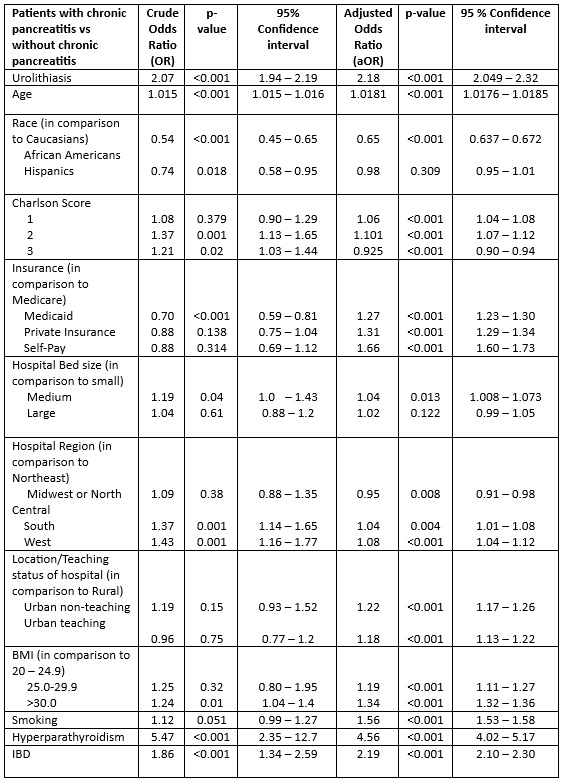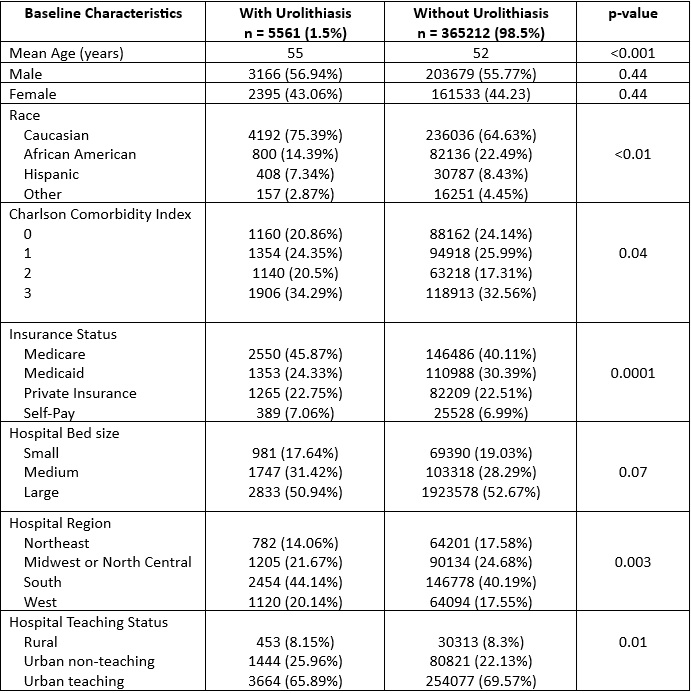Monday Poster Session
Category: Biliary/Pancreas
P2158 - Groans and Stones: Chronic Pancreatitis and Urolithiasis -- A National Inpatient Sample-Based Study
Monday, October 27, 2025
10:30 AM - 4:00 PM PDT
Location: Exhibit Hall

Mustafa Shah, MD
Geisinger Health System
Danville, PA
Presenting Author(s)
Mustafa Shah, MD1, Hameed Ullah, MD2, Osama Sherjeel Khan, MD3, Khushbakht Maheen, MBBS4, Muhammad Arsalan, MD2, Alvina Karam, MD5, Abu Hurairah, MD6
1Geisinger Health System, Danville, PA; 2St. Luke's Hospital, Chesterfield, MO; 3Cleveland Clinic Florida, Weston, FL; 4Khyber Medical College, Danville, PA; 5Appalachian Regional Healthcare, Lexington, KY; 6AdventHealth, Orlando, FL
Introduction: Chronic pancreatitis is a chronic inflammation of the pancreas that is associated with significant morbidity and mortality. Some studies have postulated an increased risk of urolithiasis with chronic pancreatitis. Our study aimed to utilize the National Inpatient Sample (NIS) database to evaluate the association between chronic pancreatitis and urolithiasis.
Methods: A retrospective cohort analysis was done using the NIS database (2016-2017). The ICD-10 CM codes were used to identify hospitalized patients with chronic pancreatitis as the exposure of interest. The above population was then screened for urolithiasis. Adjustments were made for confounders of interest, including basic demographic data, Charlson comorbidity scores, obesity, and hospital characteristics. Multivariate logistic regression analysis models were constructed to calculate the adjusted odds ratio of urolithiasis among patients with chronic pancreatitis.
Results: 370,774 hospitalizations with chronic pancreatitis were identified, of which 5562 (1.5%) were noted to have urolithiasis. Of the aforementioned population, 56.9% were males, 75.39% Caucasians, and 14.39% were African Americans. 45.87% had Medicare insurance, and 54.79% had a Charlson comorbidity index score of 2 or higher. Detailed baseline characteristics of the patients in the two groups are described in Table 1. Chronic pancreatitis was found to have a significantly higher association with urolithiasis (aOR: 2.18, p-value< 0.001). After adjusting for confounders, age, higher BMI, hyperparathyroidism, and inflammatory bowel disease were found to be independently associated with urolithiasis.
Discussion: Our study reveals a significant association between chronic pancreatitis and urolithiasis. The proposed mechanism, linked to fat or bile acid malabsorption, underscores the importance of physician awareness and the potential for targeted prevention strategies. By implementing these strategies, we can potentially prevent urolithiasis and improve the overall morbidity and mortality in chronic pancreatitis.

Figure: Table 1. Baseline characteristics of hospitalized patients with chronic pancreatitis.

Figure: Table 2. Crude and Adjusted Odds ratio for urolithiasis in patients with chronic pancreatitis
Disclosures:
Mustafa Shah indicated no relevant financial relationships.
Hameed Ullah indicated no relevant financial relationships.
Osama Sherjeel Khan indicated no relevant financial relationships.
Khushbakht Maheen indicated no relevant financial relationships.
Muhammad Arsalan indicated no relevant financial relationships.
Alvina Karam indicated no relevant financial relationships.
Abu Hurairah indicated no relevant financial relationships.
Mustafa Shah, MD1, Hameed Ullah, MD2, Osama Sherjeel Khan, MD3, Khushbakht Maheen, MBBS4, Muhammad Arsalan, MD2, Alvina Karam, MD5, Abu Hurairah, MD6. P2158 - Groans and Stones: Chronic Pancreatitis and Urolithiasis -- A National Inpatient Sample-Based Study, ACG 2025 Annual Scientific Meeting Abstracts. Phoenix, AZ: American College of Gastroenterology.
1Geisinger Health System, Danville, PA; 2St. Luke's Hospital, Chesterfield, MO; 3Cleveland Clinic Florida, Weston, FL; 4Khyber Medical College, Danville, PA; 5Appalachian Regional Healthcare, Lexington, KY; 6AdventHealth, Orlando, FL
Introduction: Chronic pancreatitis is a chronic inflammation of the pancreas that is associated with significant morbidity and mortality. Some studies have postulated an increased risk of urolithiasis with chronic pancreatitis. Our study aimed to utilize the National Inpatient Sample (NIS) database to evaluate the association between chronic pancreatitis and urolithiasis.
Methods: A retrospective cohort analysis was done using the NIS database (2016-2017). The ICD-10 CM codes were used to identify hospitalized patients with chronic pancreatitis as the exposure of interest. The above population was then screened for urolithiasis. Adjustments were made for confounders of interest, including basic demographic data, Charlson comorbidity scores, obesity, and hospital characteristics. Multivariate logistic regression analysis models were constructed to calculate the adjusted odds ratio of urolithiasis among patients with chronic pancreatitis.
Results: 370,774 hospitalizations with chronic pancreatitis were identified, of which 5562 (1.5%) were noted to have urolithiasis. Of the aforementioned population, 56.9% were males, 75.39% Caucasians, and 14.39% were African Americans. 45.87% had Medicare insurance, and 54.79% had a Charlson comorbidity index score of 2 or higher. Detailed baseline characteristics of the patients in the two groups are described in Table 1. Chronic pancreatitis was found to have a significantly higher association with urolithiasis (aOR: 2.18, p-value< 0.001). After adjusting for confounders, age, higher BMI, hyperparathyroidism, and inflammatory bowel disease were found to be independently associated with urolithiasis.
Discussion: Our study reveals a significant association between chronic pancreatitis and urolithiasis. The proposed mechanism, linked to fat or bile acid malabsorption, underscores the importance of physician awareness and the potential for targeted prevention strategies. By implementing these strategies, we can potentially prevent urolithiasis and improve the overall morbidity and mortality in chronic pancreatitis.

Figure: Table 1. Baseline characteristics of hospitalized patients with chronic pancreatitis.

Figure: Table 2. Crude and Adjusted Odds ratio for urolithiasis in patients with chronic pancreatitis
Disclosures:
Mustafa Shah indicated no relevant financial relationships.
Hameed Ullah indicated no relevant financial relationships.
Osama Sherjeel Khan indicated no relevant financial relationships.
Khushbakht Maheen indicated no relevant financial relationships.
Muhammad Arsalan indicated no relevant financial relationships.
Alvina Karam indicated no relevant financial relationships.
Abu Hurairah indicated no relevant financial relationships.
Mustafa Shah, MD1, Hameed Ullah, MD2, Osama Sherjeel Khan, MD3, Khushbakht Maheen, MBBS4, Muhammad Arsalan, MD2, Alvina Karam, MD5, Abu Hurairah, MD6. P2158 - Groans and Stones: Chronic Pancreatitis and Urolithiasis -- A National Inpatient Sample-Based Study, ACG 2025 Annual Scientific Meeting Abstracts. Phoenix, AZ: American College of Gastroenterology.

